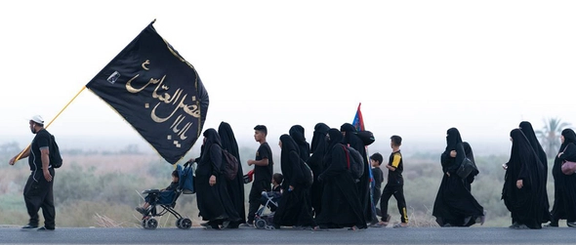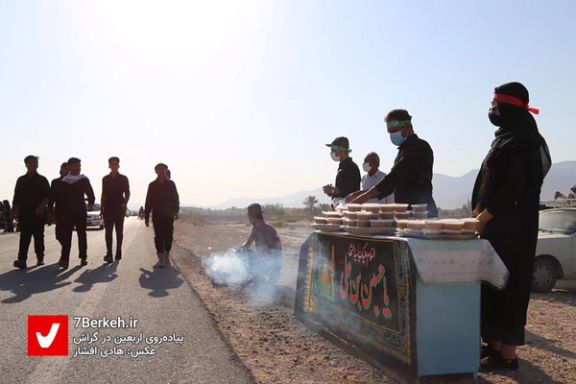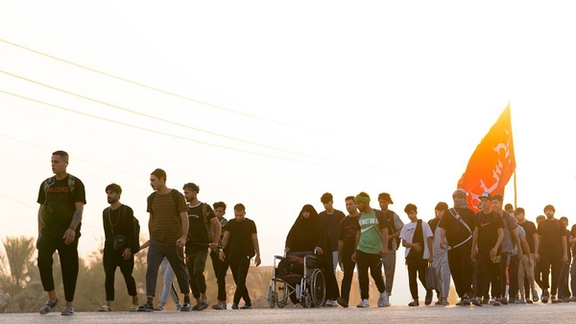Iran To Use Released Iraqi Funds To Pay Pilgrims' Annual Subsidy

Amid reports of releasing Iran's frozen funds in Iraq, the Iranian regime intends to provide 200,000 Iraqi dinars ($153) to pilgrims who travel to Iraq for Arbaeen.

Amid reports of releasing Iran's frozen funds in Iraq, the Iranian regime intends to provide 200,000 Iraqi dinars ($153) to pilgrims who travel to Iraq for Arbaeen.
The Governor of the Central Bank of Iran, Mohammad Reza Farzin, said Thursday that from this year onwards, instead of euros and dollars, pilgrims will be paid in Iraqi dinars for their pilgrimage.
The regime offers several perks to encourage people to take the pilgrimage such as a ration of cheap foreign currency – which used to be dollars or euros until this year – as well as loans, free internet on the road and inside Iraq and free health checks and rest stops along the way.
Arbaeen (literally meaning fortieth) is a Shiite religious observance that occurs forty days after the Day of Ashura, when according to religious legend Husayn (Hussain) ibn Ali , the grandson of Prophet Muhammad was killed on the 10th day of the month of Muharram in 680 AD.
Millions of Shiite Muslims travel to the Iraqi city of Karbala, the site of the Shiite Imam’s shrine and resting place, for Arbaeen. A large number of the pilgrims start their journey from other religious cities – such as Najaf and Kadhimiya -- and walk on foot for days – hundreds of kilometers -- to reach Karbala. There are no reliable methods for tallying the number of visitors to Iraqi holy Shia sites during Arbaeen. In 2019, before the pandemic, an estimated 15 million people from various countries attended the ceremonies.

Majid Mirahmadi, a deputy interior minister and the head of Iran's taskforce for Arbaeen pilgrimage, has predicted that this year more than four million Iranian pilgrims will travel to Iraq to participate in the Arbaeen ceremony, which falls on September 5.
The figure is a speculation based on the number of pilgrims in the previous years but this year the annual Shiite mourning ceremonies took an unprecedented anti-regime tone as people chanted religious verses that were critical of the regime and its repressive actions. This may signal a lower turnout for the Arbaeen this year.
If Mirahmadi’s number is right, it means that Iranian banks will pay at least 800 billion Iraqi dinars to the pilgrims, which is equivalent to more than $600 million. Although the regime will sell the dinars to the pilgrims cheaper than the rate in the market, it can still pocket a large sum of its national currency and thus make a cash profit from its released funds.
Earlier this week, the Biden Administration announced that some of Iran’s frozen funds in Iraq will go to Oman, acting as a conduit to release the money for purchasing non-sanctionable goods under US supervision. Iraq owes Iran around $11 billion for imports of gas and electricity, but US banking sanctions prohibit dollar transactions with Iran.
In June, the US agreed to make $2.7 billion available for Iran’s humanitarian needs. In July, Iraqi Prime Minister Mohammed Shia Sudani said Baghdad will begin trading crude oil for Iranian gas to end payment delays to Tehran due to the need for US approval.
Critics of the Biden administration slam the White House for inconsistent enforcement of sanctions against Iran’s oil trade, leading to the highest Iranian oil export levels since the United States withdrew from the Joint Comprehensive Plan of Action (JCPOA) in 2018 and imposed sanctions.
“It’s troubling to see the administration helping to fill Iran’s coffers while the Islamic Republic continues to increase its malign activities on all fronts: terrorism and terror finance, nuclear mendacity, hostage-taking, and assassination attempts, in addition to human rights abuses against its own people," said Toby Dershowitz, a Senior Vice President at the Foundation for Defense of Democracies.

Iran's Roads Ministry said in June that 2,000 buses have been imported for this year's Arbaeen pilgrimage to Iraq, despite the country’s serious shortage of buses for the national fleet and city transportation. Last year, Iran had designated 2,200 buses for pilgrims inside Iraq, but the Iraqi authorities did not allow the buses to enter the country.
The Iranian government spends hundreds of millions of dollars and huge resources each year to sponsor the Arbaeen pilgrimage to Karbala, among the largest annual gatherings in the world, to show that its Shiite ideology is influential both domestically and in the region.
Government organizations and the state affiliated charities as well as municipalities and city councils often allocate considerable budgets to organize the Arbaeen Walk. Some officials and clerics say the Arbaeen gathering is one of the manifestations of the Shia “soft power’.